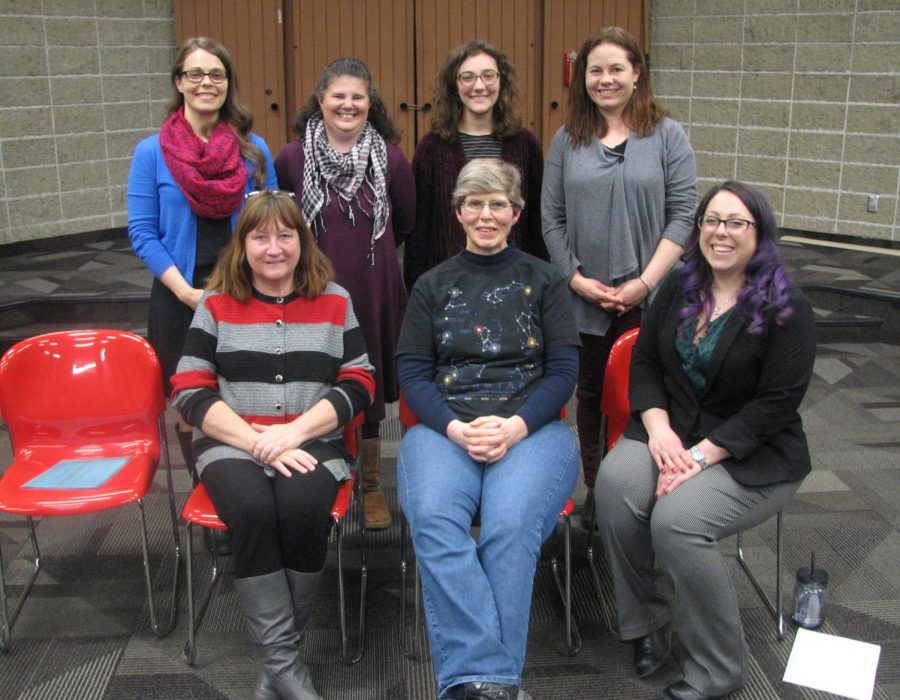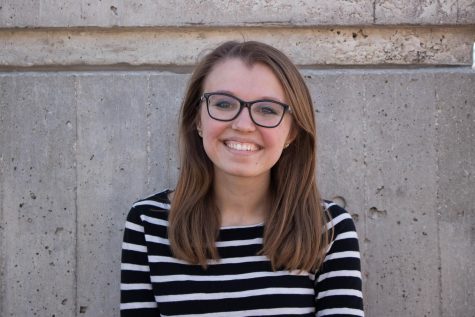Women’s panel tackles tough issues
On Tuesday, Feb. 26, a panel discussion was held in the Communication Arts Building to discuss the challenges faced by women in male-dominated fields.
Feb 28, 2019
A group of students, staff and community members braved the icy weather to attend Theatre UNI’s Women in Science Panel Thursday night. A panel of female leaders spoke about the difficulty they face as outliers in their respective fields.
This discussion served as a promotional and informative event for two of the current women-empowering theatre productions in Eastern Iowa: Theatre UNI’s “Legacy of Light,” and Theatre Cedar Rapids’ (TCR) “Ada and the Memory Engine.”
At 7 p.m., the panel opened with an introduction of the speakers. The women on the panel represented a mix of ages and specialties, but their passions were the same: representation and inclusion.
Rachel Morgan, an instructor in the Languages and Literatures Department, served as the moderator.
One participant in the discussion was Amy Osatinski, an assistant professor of theatre and the director for “Legacy of Light.”
Representing the science side of the discussion was the Earth and Environmental Sciences Department Head Siobhan Morgan, who brought in her personal experience of being a female astrophysicist.
Both the panel and these two theatre productions combine several often uncorrelated areas of study, such as theatre, math, art and astrophysics.
The women answered questions about both productions, as well as addressed specific challenges that being “the only women in the room” in their respective fields sometimes presents.
“I never realized the barriers of my gender until I was the only one,” said Carla Lienhard, an attendee of the panel and a UNI graduate in information systems. She is currently working for John Deere.
Morgan also shared the frustration she experienced from being the token female in the past.
Since she began teaching at UNI in 1991, Morgan said there are more women studying science now than ever, but the number is nowhere close to being equal to that of men in the department.
She believes that more women are moving into the field of astrophysics, but it is happening very slowly. The slow increase of women entering science fields was a theme throughout the discussion.
Osatinski echoed this sentiment by sharing statistics of women in high-ranking theatre roles, which she said are “atrocious.”
Osatinski said that the only design jobs in theatre that have more women than men are in costumes. She shared how difficult it can be for women to land directing roles in the theatre world, and that this is largely due to people being offered jobs based on networking, and men often hire their male friends. She said that this results in a lack of female voices at the table.
Lisa Kelly, director of “Ada and the Memory Engine,” said she is excited to share the life of the first computer programmer and bring the figures who are hidden from the light onto the stage.
Jessica Link, who is playing Ada Byron Lovelace in TCR’s show and is an alumni of the UNI Theatre Department, expressed how difficult it is for women to acquire acting jobs, and that there are often fewer opportunities for women on the stage.
According to Link, the show she is starring in, a story about a woman, written by a woman, has more male characters in it than female ones.
The discussion wrapped up with a question about what advice the panel has for young women about the enter the workforce.
“I have worked every level of theatre; collegiate, professional, and community. I have experienced sexual harassment in every single one,” Link said. “My advice to you is to know your chain of command. If your boss doesn’t listen to you, go to the person above him until you find someone who does.”
The women nodded in agreement, and the atmosphere took on a somber tone.
The panel concluded with questions from the audience.
An audience member asked, “As a white, cisgender male, what can I do to help the women around me? How can I be an ally?”
Almost simultaneously, the women responded with varying degrees of, “See something, say something.”
Kayleigh Sizemore, a student majoring in Theatre for Youth and Creative Writing and the dramaturg for “Legacy of Light” said, “Men can do a lot to help. The moments when there are no women in the room, and the men are saying sexist things, standing up and saying something could change the culture we live in.”









